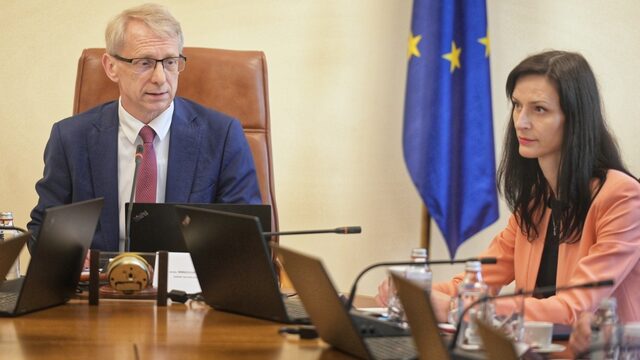Last week marked the first 100 days in power of the rotational cabinet of WCC-DB and GERB, which was conceived after two inconclusive elections, followed by protracted negotiations. Most questions that arose during the talks in April and May remain unresolved: what is the nature of the partnership between the two factions? Who takes the decisions within what was self-mockingly called "sglobka," or an assemblage, by some of its members that are unwilling to call it a coalition? And - most of all - would the Denkov-Gabriel cabinet manage to attain its ambitious goals, including passing an effective anti-corruption mechanism and making inroads into Schengen and the Euro?
The optimistic reading of the last 100 days is that some important promises are simply a work in progress. This does not mean that nothing has been accomplished. One major achievement was the return of control over the various levels of the executive after the megalomaniacal scale of cadre changes undertaken by President Rumen Radev's two interim governments. Along with this, the new appointments also showed the actual distribution of power between the two majority parties - and their unsolicited partners from MRF.
Who's who in the "assemblage"?
GERB leader Boyko Borissov consistently tries to imply that the formation of Kiril Petkov and Assen Vassilev governs alone. "We support 36 MPs from the party of change (WCC), they govern 100%, I exclude the foreign ministry," Mr Borissov said at the end of August, underlining that GERB's participation is limited to the ministerial post of Mariya Gabriel, due to take over as PM from Nikolay Denkov in early March 2024.
The claim that WCC governs by itself contradicts Mr Borissov's vocal dissatisfaction with appointments that are not coordinated with him, such as changes to the leadership of the state lottery and the State Consolidation Company.
In the past three months the ruling parties have been mostly engaged in coordination and disputes over ministers, regional governors, and who should fill which post in the second echelon of power. So there has to be an agreement between the WCC-DB and GERB for each position. In some of the sectors with the status of the most preferred for corruption schemes, the reformist forces apparently do not have the "percentages" to allow them to implement change.
Peevski's role
Against this backdrop, WCC-DB claim they have a stable majority, which goes beyond the formal governing format with GERB, and includes the MRF. The movement's votes in parliament are needed for the constitutional changes announced as a top priority and this explains the intensive courtship of the important figures in it.
The signature of Delyan Peevski MP, sanctioned for corruption under the global Magnitsky Act, now stands almost invariably alongside those of Kiril Petkov and Hristo Ivanov as co-sponsors of various legislative initiatives. The special operation to launder his image is in full swing and, apart from goodwill, is a sign of the voluntary submission of WCC-DB to Mr Peevski's political interests. The development of this new political situation might be worth betting on, as external pressure might turn Mr Peevski into a reformer who will bring rule of law to Bulgaria. Or it might spell the end of both WCC and Democratic Bulgaria as contenders to reform the system.
What changed the most?
In the three months since President Rumen Radev lost the levers of power, Bulgaria has returned to its position as an EU and NATO partner vis-a-vis Russia's war against Ukraine. This common cause forged the alliance of the two main opposing camps in politics and has remained steadfast since.
Defense Minister Todor Tagarev's hardline stance on military support for Ukraine and against Kremlin interference in the country's internal affairs, however, has made him a target, including for WCC-DB's partners in government.

And what about the other priorities?
The rotating government did not present a comprehensive governance programme for its mandate with an initial horizon of 18 months. Several key priorities were announced, all of which are in varying degrees of indeterminacy or postponement at present:
- Constitutional reform for changes in the structure of the prosecution and the High Judicial Council (SJC)
This reform is subject to all the actions and compromises of WCC-DB, but no one can say for sure if, when and how it will happen. So far, we have seen the slow formation of a portfolio committee in parliament with the entry and exit of Delyan Peevski and the extension of the mandate of the current SJC for another six months. We are also awaiting the public debate on the draft constitutional amendments and whether it will lead to the desired result - an independent justice system and a functioning rule of law.
- Joining Schengen this year and the euro area in 2025
Three months ago Schengen seemed a more achievable task, but, recently, counter signals have again been detected. There has been little change in the position of the objecting Netherlands - where they expect Bulgaria "to demonstrate that cases of corruption at the highest levels of government are taken seriously." It also points to Romania's "far more tangible" progress and this has led to conjecture that eventually Bulgaria could be left behind. Regarding the Eurozone, a good chance remains, with finance minister Assen Vassilev expressing hope that inflation will also fall within the required level by the deadline.
- Return of fully machine voting and changes in the composition of the CEC
A month-and-a half before the local elections there is still no decision on either.
- Adoption of a mechanism for the appointment and election of expired regulators
There are reports of resistance to the signing of such a document which, even if proposed, will not be adopted.
- Adoption of legislative changes to exempt the leadership of the Bulgarian security services from foreign influence
The inaction of at least the services with regard to Russian interference in Bulgaria's internal affairs, if not their cooperation, was raised when the government was formed, but only in recent days has such a bill been mooted. It envisages a structural reform that would allow the replacement of heads of services appointed by the caretaker governments of Mr Radev, but it is not clear yet whether the majority is unanimous in dropping the presidential decree that has so far allowed this to happen. The timeframe in which the changes will be adopted is also important, and even more so is what kind of personalities will be selected for these key structures for the country's geopolitical affiliation.
Thus, almost all of the more important actions expected from the new government remain to be taken. With the rise of immediate challenges that have to be tackled on the go - like the natural disaster on the Southern Black Sea coastline and farmers' protests - this might mean their indefinite postponement.
Cadres decide everything
One of the government's inevitable duties was having to shuffle personnel after the president's long reign. The process of negotiating appointments between GERB and WCC-DB was difficult and often had conflicting results. Unlike previous coalitions, in which the "portions" were distributed officially and according to a somewhat clear formula (in the triple coalition of NDSV, MRF and BSP from 2005-2009 the distribution was formally known as "3-5-8"), in the current "assemblage" the principle of appointments is rather foggy. It's reasonable to assume that backroom peddling in various sectors still holds sway. Worse still, the perennial problem that has clouded governance is also largely unchanged - appointing people of shady dependencies, usually without the necessary attributes, to important posts.
By refusing to call the government a coalition, the WCC-DB armed Borissov and GERB with the opportunity to pass the buck and wring their hands. The compromises that WCC-DB makes are justified by the overriding interest of the country to stand on a solid foundation for development that will bring more justice and prosperity. But if the final impression is of more of the same, the blurring of political lines and the all-at-the-table format will come at a high price. And the chances of real change will be lost, probably for a long time.
Last week marked the first 100 days in power of the rotational cabinet of WCC-DB and GERB, which was conceived after two inconclusive elections, followed by protracted negotiations. Most questions that arose during the talks in April and May remain unresolved: what is the nature of the partnership between the two factions? Who takes the decisions within what was self-mockingly called "sglobka," or an assemblage, by some of its members that are unwilling to call it a coalition? And - most of all - would the Denkov-Gabriel cabinet manage to attain its ambitious goals, including passing an effective anti-corruption mechanism and making inroads into Schengen and the Euro?
The optimistic reading of the last 100 days is that some important promises are simply a work in progress. This does not mean that nothing has been accomplished. One major achievement was the return of control over the various levels of the executive after the megalomaniacal scale of cadre changes undertaken by President Rumen Radev's two interim governments. Along with this, the new appointments also showed the actual distribution of power between the two majority parties - and their unsolicited partners from MRF.












